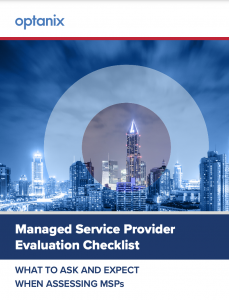
How to Choose a Managed Service Provider: 5 Questions to Ask
It is essential for businesses to know how to choose a managed service provider (MSP) that will fit their needs. Choosing an IT provider of any sort is a major decision given the importance of IT providers to modern businesses, and none are more important than the MSP. After all, MSPs provide the infrastructure to deliver key business services. They help ensure everything along the chain, from the ability to conduct successful IT operations all the way through to customer satisfaction. There is a direct correlation between the performance of the MSP and the revenues generated by your business services.
What to Look for in a Managed Service Provider
Finding the right MSP for your organization isn’t easy. You need to look internally and take stock of your needs and goals. You also need to know what to look for in a managed service provider. This requires you to be familiar with the managed service provider business model as well as managed services best practices.
So what makes a good managed service provider? With 20+ years as an MSP, Optanix is uniquely qualified to tackle this topic. In addition to our curated list of managed service provider interview questions we have leaned on our deep experience to create the following five questions to help you determine how to choose a managed provider you can trust to support your IT environment and help you meet your organizational goals.
1. What is the experience and dependability of the MSP?
Considering the overwhelming consequences of choosing the wrong IT provider, the best place to start is to look at the MSP as a company. Do they have a demonstrable track record? Can they lay claim to a list of successful engagements? Do they have experience working with organizations such as yours or in the same sector? Have they been in business for a while?
If the answer to any of these questions is not acceptable, it’s probably best to look elsewhere. When it comes to dependability, it’s worth checking into the financial stability of the MSP. It would be inadvisable to engage with an MSP that could potentially not be there to support you in the long run.
2. Does the MSP have the core competency to deliver?
You need to consider if the MSP has the specific expertise required to support your services. Today’s service delivery infrastructure is a complex labyrinth of interconnected systems that takes serious technical know-how to operate.
Does the MSP have the tools, technologies and processes to address your particular needs? Do they depend on other providers to deliver a specific service? What ability do they have to scale for the future?
The best way to explore these questions is to have multiple use cases prepared for the services you require immediately and in the near future. These can then be used to ascertain the real-world ability of the MSP to support those use cases. It will rapidly become clear which MSP possesses the competence and adheres to the managed services best practices needed to support you in the short and long term.
 Need insight on evaluating a managed service provider for your organization? Download this MSP Evaluation Checklist to ensure you select the best partner.
Need insight on evaluating a managed service provider for your organization? Download this MSP Evaluation Checklist to ensure you select the best partner.
3. What is the caliber of staffing at the MSP?
While tools, technologies and processes are key to what makes for a good MSP, let’s not forget the most basic resource: qualified and capable staff.
Does the MSP have a program in place to maintain the skills of its staff? Do they have initiatives to maintain certifications and standards? Do they have the expertise in-house or do they depend on external contractors for certain roles?
Consider if they have the ability to provide professional services. Keep in mind that they will help guide you with technology decisions as your needs change and your business grows.
4. What is the MSP’s capability to manage abnormal situations?
Competence and capability are two different things. Capability becomes extremely important when things go awry. Here are some examples of what to look for in an MSP when attempting to determine if they are capable of managing abnormal situations:
- The MSP’s ability to respond to outages and service delivery interruptions: Service-level agreements provide a reliable method to compare vendors in this regard.
- The kind of security protocols that are in place: The MSP will be in possession of your confidential data. They must be able to provide a high level of confidence in their protection and countermeasure strategies.
- The MSP’s capabilities in terms of business continuity and disaster recovery: In the event of a crisis, not only must the MSP have the ability to survive, but provisions in place to keep you running in critical situations.
5. Does the MSP support multiple engagement models?
MSP business models typically include a variety of engagement modes to suit a variety of service delivery needs. Look for an MSP that has the capability to meet your particular business and operational needs. This could mean managing the delivered services remotely, providing the IT operations management platform as a service, or a blended model with shared responsibilities.
Importance of Choosing the Right MSP
An MSP is not just another vendor you work with. They will quickly become one of your most trusted business partners, upon whom you can depend to provide the very services your business delivers.
How you choose your MSP is one of the most important business decisions you’ll make. Make sure your team takes the time to answer the questions discussed here, and then make the best choice.
If you are seeking a Cisco MSP, click here to discover proven managed services from Optanix.